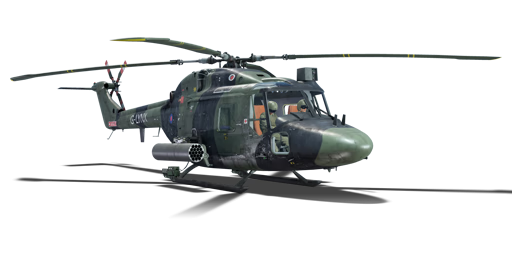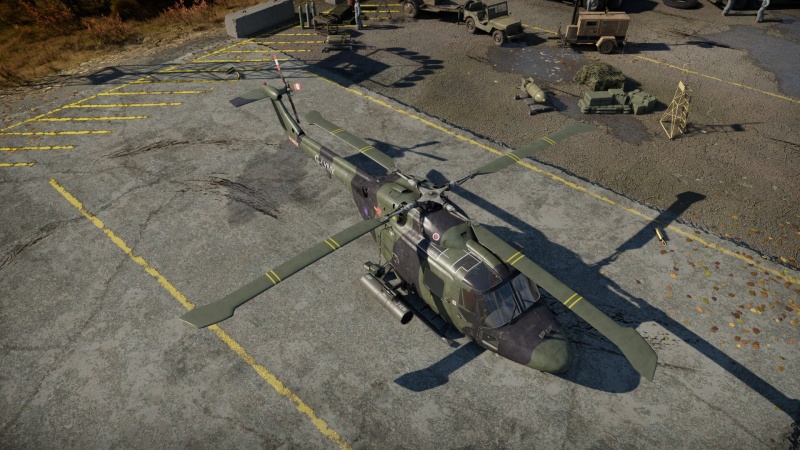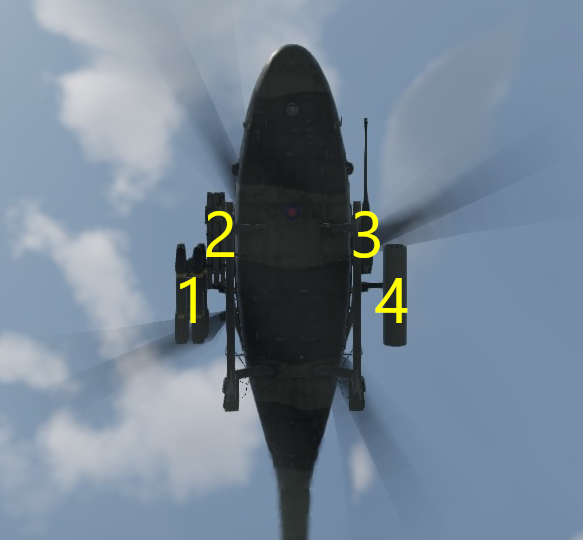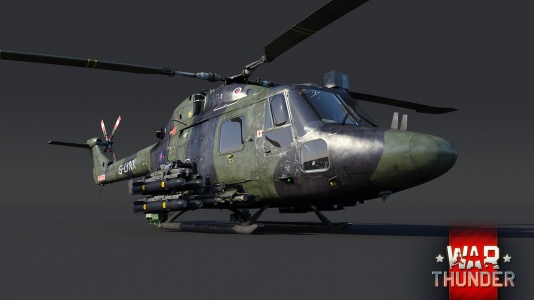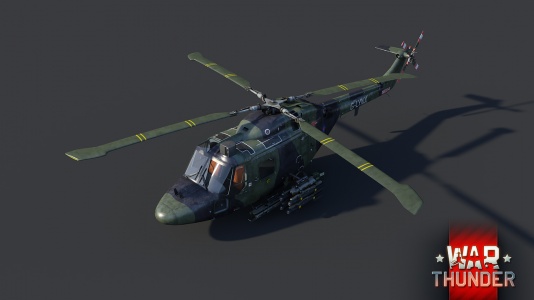Difference between revisions of "G-LYNX"
(→Description) (Tag: Visual edit) |
(→Description: Rewritten for the G-LYNX) |
||
| Line 11: | Line 11: | ||
== Description == | == Description == | ||
<!-- ''In the description, the first part should be about the history of and the creation and combat usage of the helicopter, as well as its key features. In the second part, tell the reader about the helicopter in the game. Insert a screenshot of the vehicle, so that if the novice player does not remember the vehicle by name, he will immediately understand what kind of vehicle the article is talking about.'' --> | <!-- ''In the description, the first part should be about the history of and the creation and combat usage of the helicopter, as well as its key features. In the second part, tell the reader about the helicopter in the game. Insert a screenshot of the vehicle, so that if the novice player does not remember the vehicle by name, he will immediately understand what kind of vehicle the article is talking about.'' --> | ||
| − | + | Following initial orders, Westland retained one unit of the [[Lynx AH.Mk.1|Lynx]] as a demonstrator and trial aircraft, which was given the civil registration '''G-LYNX'''. Built in 1978, it was taken on a range of demonstration tours across Europe and the Middle East, hoping to drive export sales. The helicopter was also used to test various equipment. Most notably, in mid-1986, G-LYNX underwent a short but extensive modification programme, including the installation of uprated Rolls-Royce Gem 60 engines and new British Experimental Rotor Programme (BERP) blades, significantly increasing its lift and power delivery. On 11 August 1986, G-LYNX, flown by Westland chief test pilot Trevor Eggington, sustained a speed of 400.87 km/h over the Somerset Levels, an FAI world speed record which it still holds to this day. Following its record-breaking flight, G-LYNX continued its role in demonstration and equipment trials until it was finally retired in 1992. In 1994, Westland agreed to entrust G-LYNX to The Helicopter Museum in Weston-super-Mare, UK, and in 2007 began restoration of G-LYNX to its record-breaking configuration using original and replacement components sourced by The Helicopter Museum. The restored G-LYNX was finally unveiled in 2011 and is now exhibited in the museum as a permanent display. | |
| − | It was introduced as a [[wt:en/news/6320-development-britain-s-top-lynx-ah-mk-1-and-premium-g-lynx-en|premium pack]] in [[Update 1.91 "Night Vision"]]. It was removed from the store after the [[wt:en/news/6924-shop-war-thunder-birthday-sale-in-gaijin-net-store-en|8th Anniversary Sale]], and was reintroduced in [[Update "Hot Tracks"]] as a Golden Eagle {{ge}} purchasable vehicle. The '''{{Specs|name}}''' is a very capable helicopter for its BR, featuring | + | It was introduced as a [[wt:en/news/6320-development-britain-s-top-lynx-ah-mk-1-and-premium-g-lynx-en|premium pack]] in [[Update 1.91 "Night Vision"]]. It was removed from the store after the [[wt:en/news/6924-shop-war-thunder-birthday-sale-in-gaijin-net-store-en|8th Anniversary Sale]], and was reintroduced in [[Update "Hot Tracks"]] as a Golden Eagle {{ge}} purchasable vehicle. The '''{{Specs|name}}''' is a very capable helicopter for its BR, featuring good flight performance, decent optics, and very capable armament. The engines on the G-LYNX are nothing special, however, it's very agile, being able to pull very tight turns that other helicopters simply can't do. The armament is great, with access to AGM-114 Hellfire ATGMs that prove very lethal. However the survivability is very poor, and also, even though it has access to thermals, the zoom on the optics is very mediocre: acquiring targets at long distance may be challenging. |
== General info == | == General info == | ||
Revision as of 20:13, 10 December 2023
| This page is about the British helicopter G-LYNX. For the regular version, see Lynx AH.Mk.1. |
Contents
Description
Following initial orders, Westland retained one unit of the Lynx as a demonstrator and trial aircraft, which was given the civil registration G-LYNX. Built in 1978, it was taken on a range of demonstration tours across Europe and the Middle East, hoping to drive export sales. The helicopter was also used to test various equipment. Most notably, in mid-1986, G-LYNX underwent a short but extensive modification programme, including the installation of uprated Rolls-Royce Gem 60 engines and new British Experimental Rotor Programme (BERP) blades, significantly increasing its lift and power delivery. On 11 August 1986, G-LYNX, flown by Westland chief test pilot Trevor Eggington, sustained a speed of 400.87 km/h over the Somerset Levels, an FAI world speed record which it still holds to this day. Following its record-breaking flight, G-LYNX continued its role in demonstration and equipment trials until it was finally retired in 1992. In 1994, Westland agreed to entrust G-LYNX to The Helicopter Museum in Weston-super-Mare, UK, and in 2007 began restoration of G-LYNX to its record-breaking configuration using original and replacement components sourced by The Helicopter Museum. The restored G-LYNX was finally unveiled in 2011 and is now exhibited in the museum as a permanent display.
It was introduced as a premium pack in Update 1.91 "Night Vision". It was removed from the store after the 8th Anniversary Sale, and was reintroduced in Update "Hot Tracks" as a Golden Eagle ![]() purchasable vehicle. The G-LYNX is a very capable helicopter for its BR, featuring good flight performance, decent optics, and very capable armament. The engines on the G-LYNX are nothing special, however, it's very agile, being able to pull very tight turns that other helicopters simply can't do. The armament is great, with access to AGM-114 Hellfire ATGMs that prove very lethal. However the survivability is very poor, and also, even though it has access to thermals, the zoom on the optics is very mediocre: acquiring targets at long distance may be challenging.
purchasable vehicle. The G-LYNX is a very capable helicopter for its BR, featuring good flight performance, decent optics, and very capable armament. The engines on the G-LYNX are nothing special, however, it's very agile, being able to pull very tight turns that other helicopters simply can't do. The armament is great, with access to AGM-114 Hellfire ATGMs that prove very lethal. However the survivability is very poor, and also, even though it has access to thermals, the zoom on the optics is very mediocre: acquiring targets at long distance may be challenging.
General info
Flight performance
The G-LYNX is a fast and nimble helicopter, being able to achieve speeds many other helicopters can't get to. It also is able to perform many manoeuvres that many other heavier helicopters can't accomplish.
| Characteristics | Max Speed (km/h at 1,000 m) |
Max altitude (metres) | |
|---|---|---|---|
| AB | RB | ||
| Stock | 326 | 302 | 5400 |
| Upgraded | 391 | 360 | |
Survivability and armour
The G-LYNX lacks any armour protection for the crew, and due to the size and placement of the fuel tanks the helicopter can be set on fire easily. It does support the choice of mounting 192 flares to the helicopter, giving it a way to dodge incoming IR-seeking air-to-air missiles.
Modifications and economy
Armaments
Offensive armament
The G-LYNX is armed with:
- A choice between two presets:
- Without offensive armament
- 192 x countermeasures
Suspended armament
The G-LYNX can be outfitted with the following ordnance presets:
- 1 x 20 mm Oerlikon KAD-B cannon (570 rpg) + 38 x Hydra-70 M247 rockets
- 4 x ATAS (AIM-92) missiles
- 4 x AGM-114B Hellfire missiles
- 8 x AGM-114B Hellfire missiles
- 4 x BGM-71D TOW-2 missiles
- 8 x BGM-71D TOW-2 missiles
- 1 x 20 mm Oerlikon KAD-B cannon
- 1 x 20 mm Oerlikon KAD-B cannon + 2 x ATAS (AIM-92) missiles + 8 x AGM-114B Hellfire missiles
Custom loadout options
| 1 | 2 | 3 | 4 | ||
|---|---|---|---|---|---|
| 20 mm Oerlikon KAD-B cannons (570 rpg) | 1 | ||||
| Hydra-70 M247 rockets | 19 | 19 | |||
| AGM-114B Hellfire missiles | 4 | 4 | |||
| ATAS (AIM-92) missiles | 2 | 2 | |||
| BGM-71D TOW-2 missiles | 4 | 4 | |||
| Maximum permissible weight imbalance: 200 kg | |||||
Usage in battles
Ground RB
The G-LYNX is a great helicopter to take out in ground RB due to its loadout of 8 Hellfires. While many other helicopters like the AH-1Z can carry twice as many, the G-LYNX can do so while retaining its decent manoeuvrability and speed. It also is equipped with a thermal view for the ATGM shooter camera, making it easy to spot enemies on the ground and in the air. The Hellfires can be ripple fired, making destroying multiple open targets really easy. There is also a choice to take out TOW-2 missiles, which offer better control than the Hellfires, with the tradeoff of being slower and having less range (3.75 km, compared to the AGM-114's 8 km). The G-LYNX also supports Hydra-70 unguided rockets, which you get 38 of. These can be used at close range to great effect, although at longer ranges it is hard to aim them due to the lack of a Ballistic Computer onboard.
In terms of air-to-air armament, the G-LYNX sports the choice of 4 AIM-92 Stingers, or 2 AIM-92 Stingers and a single 20 mm Oerlikon KAD-B cannon with 570 rounds of ammo. The latter is usually preferred due to the unreliability of the Stinger missiles. The Stingers might not kill the target with a hit, or the target might have countermeasures against IR-seeking missiles. With this it would leave the G-LYNX defenceless against aerial targets. That's why equipping the 20 mm cannon over the 2 extra missiles is a good choice. It can deal with aircraft who get too close.
Helicopter Battles (Arcade)
While the G-LYNX does sport Stingers to deal with enemy helicopters, they are unreliable to use in the Heli EC gamemode. The Hellfires can really deal with close range targets as with long range targets, the missiles would take a top down approach, making it highly likely to miss the enemy. The TOW-2s would be a good way to down enemy helicopters, but leading them is quite hard and it will likely result in a miss. As it is with Ground RB, the gun is again really important for the armament of the G-LYNX. Being able to defend against helicopters who get too close for missiles is a good thing.
Pros and cons
Pros:
- Hellfire missiles that are great for ground targets.
- Thermal sight.
- Good manoeuvrability.
- Perfect control at high speed (400 km/h).
- Fastest helicopter in the game
Cons:
- The main gun is fixed on the airframe.
- Doesn't have any long range AA armament (over 6 km).
- Stinger air-to-air missiles are inherently unreliable, especially at ranges above 1 km
History
Development on the Lynx began in the mid 1960s, when Westland sought a replacement for its existing Scout and Wasp helicopters, while also wanting to provide a more advanced alternative to the UH-1 Iroquois.
After some delays, the first prototype was ready for testing by the early '70s. In March 1971, the prototype conducted its maiden flight. In further sorties, the Lynx managed to break a number of world speed records for helicopters. Quite content with the Lynx's performance, the British Army placed an order for 100 units of the type to be produced in the mid '70s. Subsequently, the Lynx received its official army designation 'Lynx AH Mk.1'.
Since its introduction to service, the Lynx saw service primarily with the British Army and the Royal Navy in various different roles, including among others transport, armed escort and anti-tank warfare. Furthermore, the Lynx also saw service with countries such as the Netherlands, Norway and Argentina, while other countries like Germany, France, Denmark, South Korea, Brazil and Portugal, to name a few, still use variants of the Lynx today.
During their service, Lynx helicopters found themselves taking part in numerous conflicts, including the Falklands and Gulf wars, military interventions on the Balkans during the 1990s, anti-piracy efforts in Somalia and many more thanks to their ongoing service today. In total, around 450 Lynx helicopters of various modifications have been produced by 2009, with production still ongoing today.
- From Devblog
Media
- Skins
- Images
- Videos
See also
External links
| Westland Aircraft Limited | |
|---|---|
| Aircraft | |
| Fighters | Whirlwind Mk I · Whirlwind P.9 |
| Turboprop | Wyvern S4 |
| Helicopters* | |
| Attack | AH Mk.1 Apache** |
| Utility | Wessex HU Mk.5 · Scout AH.Mk.1 · Wasp HAS.Mk.1 · Lynx AH.Mk.1 · G-LYNX |
| *After World War II, Westland Aircraft focused on building helicopters and changed its name to Westland Helicopters. | |
| **Licensed AH-64D | |
| See Also | Boeing Aircraft |
| Britain helicopters | |
|---|---|
| Attack | AH Mk.1 Apache · Rooivalk Mk1F CSH · Superhind |
| Utility | Wessex HU Mk.5 · Scout AH.Mk.1 · Wasp HAS.Mk.1 · Lynx AH.Mk.1 · G-LYNX |


